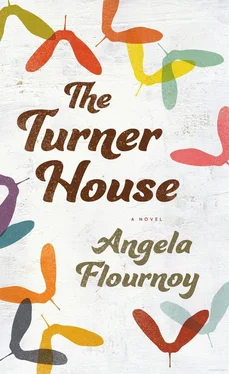“Call me Alice,” she said. She did not ask if she should call him Charles, his full name, and Cha-Cha didn’t tell her otherwise.
“Your report says you’re the oldest of thirteen. Tell me about that.”
Cha-Cha pegged her question as some sort of shrink trick, a roundabout way to establish him as a person with too much at-home stress, then she’d be able to move on to his hallucinations with the pressures of his big, rambling family already lined up as an explanation. He started off carefully.
“That’s right, there’s thirteen of us,” he said. “But there’s only about six or so here in the city. The rest are scattered around the country and getting along fine by themselves.”
Alice Rothman leaned back in her turquoise armchair—hotel furniture, Cha-Cha thought—and tapped her pen on her notepad.
“What are their names?”
“Francey, Quincy, Russell, Marlene, Lonnie, Antoinette, Miles, Donald, Berniece, Sandra, Troy, and Lelah,” Cha-Cha said, his cadence more like a song than a list. An image of his younger self, twelve maybe, came back to him. There’d only been the first six then, and he had made up a song for when he was “it” during Dark, a hide-and-seek game they played in the basement with its only light off. He sang in a whisper as he walked through the musty room, the low ceiling already becoming a problem for him, and when he thought he’d found someone’s hiding place (behind the water heater, in an old box), he’d stand in front of it repeating the person’s name (“Come on out, Quincy, Quincy, Quincy—hey!—Come on out, Quincy, Quincy, Quincy”) until someone came out willingly or their laughter revealed them. He’d added to the song for a few more births, but then the novelty of another body in the house wore off on him and he was too old to play Dark anyhow. He didn’t share this memory with Alice Rothman.
After names she wanted to know nicknames and the explanations for the nicknames if possible. Cha-Cha explained that his younger sister Francey was named after his father because his parents had named him, their first child, after the preacher who had married them back in Arkansas, a man Cha-Cha never met. It seemed she’d planned a series of questions that had more to do with the Turner family than with Cha-Cha as an individual, maybe to ease him into talking about himself. She wanted to know who had children, whose children had children, who was in school, who came to visit often, who was deployed and where, and who was incarcerated (“Excuse me, miss, no one is in jail,” Cha-Cha shot back). Alice Rothman glided past this last misstep and switched the subject to memories of Viola and Francis, then to Viola being by herself on Yarrow, then on to Chucky and Todd, Cha-Cha’s sons. Finally, when the hour ended, she mentioned Chrysler.
“They want me to send a decision about you sooner than later,” Alice had said, “but what do you say we push it to later? You could come again next week. Talk some more. I could move this earlier thing, and you could come at ten.”
“Alright,” Cha-Cha had said. It was just nice to sit and talk, he supposed, and not lead the conversation if he didn’t feel like it, and hold back what he wanted without the other person being any the wiser. Talking to someone who didn’t already think she knew his life story was new for him, and interesting.
Three weeks later Alice Rothman declared that Cha-Cha was not “personally culpable” for the accident, at least not from a psychological standpoint. They’d never talked about his haint in any of the meetings. Cha-Cha figured she must have been able to glean whatever it was she was looking for better by not approaching the issue head-on. If that was the case, Cha-Cha had no interest in upsetting his leave payments by bringing the haint up himself. She invited Cha-Cha to continue to come and talk to her, and he agreed. After his hip healed and he returned to work (no more driving; Cha-Cha would train new drivers now), he started using his own money to pay for visits.
Four months into the meetings, he sat in her waiting room and tried not to sweat. This was the day they’d scheduled to finally discuss his haint. Alice had said that with the “Chrysler business” behind them, Cha-Cha shouldn’t feel pressure to hold back.
Her office door opened, and Cha-Cha, not trusting a porcelain hip to hold up his 230-pound frame, used his new cane to help him stand up.
“Good morning, Charles. Come in.”
There wasn’t a typical leather couch in Alice Rothman’s office. In its place stood a mauve suede chaise, a fainting couch was what Alice called it during that first visit. Vintage, she’d said, custom reupholstered. Something a grown man, especially one with a bad hip and a beer gut, had no business lying upon, Cha-Cha thought. He’d dragged a regular old armchair from the waiting room into the office during his first visit. Alice didn’t say a word as he did this, and she hadn’t said anything about it each time he did it again. Cha-Cha wondered when she’d stop removing his chair after every visit; there was enough room for the chair and the fainting couch both.
“How’s your mother doing?” Alice asked.
“She’s doing fine, just drugged up a lot from her shoulder surgery, but she’s talking more than she’s been doing since she came out the hospital.”
A pinched nerve in Viola’s shoulder had begun giving her trouble recently. Before that, a series of strokes put her in a wheelchair and precipitated her move off of Yarrow. Before the stroke it was gallstones. Cha-Cha told Alice he feared his mother wouldn’t make it through next winter.
“You never know, Charles. Your mother sounds like a fighter.”
“I hope so. I guess all we can do is pray,” Cha-Cha said, although he suspected praying for an old woman with a lifetime behind her to have a few more days on earth was futile, possibly sinful. He knew his wife, Tina, would call it sinful.
“So. Today is haint day, isn’t it?”
“It looks that way.” He no longer wanted to discuss his haint with her. Back when the meetings were obligatory, before he’d come to know Alice, her thoughts about him and his superstitions—apparitions, whatever they were—hadn’t mattered. Now things were different. Cha-Cha feared that after they had finally gotten comfortable talking to each other, Alice might still declare him crazy, and since he knew he wasn’t crazy, he’d have no choice but to stop therapy altogether.
“We can start with the first time,” she said. She pulled out a new pad of paper from her desk drawer.
He told her about that night in the big room—the curtains hanging out the window, Francey coming to his rescue, his father’s dismissal of it all.
Alice nodded but said nothing.
“What? You don’t believe me? See, this is why we should’ve talked about this in the very beginning,”
“I didn’t say anything, Charles. But have you ever considered that you might have imagined it?”
“Six people? I’ve never heard of six people imagining the same thing at the same time.”
“Sure you have,” Alice said. “A group of kids sit up late at night telling ghost stories, then they all think they’ve seen a ghost. Happens all the time. Isn’t that what happened with the Salem witch trials?”
“I don’t know anything about witches, Alice. But I do know a little about haints. And it wasn’t just the one time when we were little. It came back.”
“Oh, I remember the insurance report. So let me play devil’s advocate for a minute. You’re driving in the rain on an all-nighter, and you think you’ve seen a ghost. A lot of people might attribute that to sleep deprivation, lightning, too much caffeine.”
Cha-Cha usually enjoyed the sparring nature of his and Alice’s talks. She volleyed his answers right back at him like one of his own sisters would. But she took things too literally—a major character flaw, he thought.
Читать дальше












